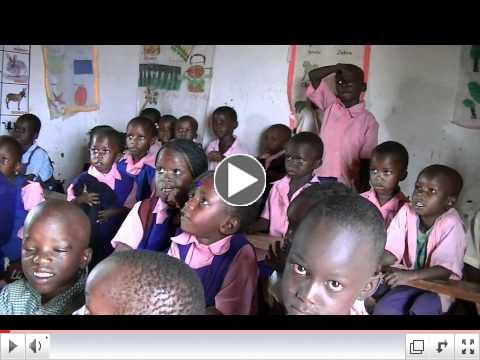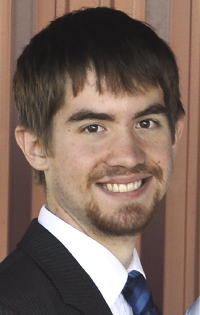|
July 17, 2011 Issue
No. 15
|
|
Greetings!
The most exciting news to us is the
rapid progress to finish construction of
JohJan LifeNets Academy for grades 1-12
in Migori, Kenya. My colleague, John
Elliott, just returned from Kenya
 |
|
JohJan LifeNets Academy - Migori,
Kenya |
and produced an excellent seven minute
video that tells about its construction
and LifeNets involvement. The YouTube
version is embedded on the right and I
invite you to watch it by clicking on
it.
Ultimately the 11 classroom school will
serve 400 students by providing a high
level of quality education, prepare some
for university level education and teach
Christian values and moral behaviors.
We will write more about the school in
the next newsletter, but you can read
the ongoing construction story in blog-like
style on our website at
http://lifenets.org/johjan/.
JohJan LifeNets Academy is becoming
known as a premier school in this rural
area of Kenya.

|
|
2010 LifeNets Annual Report |
We produced our Annual Report for the
year 2010. We are not mailing it out to
everyone generally, however, if you
would like to have a printed copy please
email us at
ar@lifenets.org, include your
address and we will send you one right
away.
The PDF report is available online and
you can download and print yourself.
You can see the report in the
"newsletter" section of our website at www.lifenets.org/newsletter.
There is a regular and high quality (2.6
meg) version online. Or click on the
image to the left to quickly see the
report.
We can't cover all the stories in this
eNewsletter, but we do communicate all
LifeNets happenings through our website.
If you have not done so, please join our
Facebook Group at
www.facebook.com/lifenets. We have
over 1800 fans and would always like to
add more. This gives us the opportunity
to tell of any new LifeNets developments
on the day they happen. Also, be sure
to check with with our Website at
www.lifenets.org/ which has the most
comprehensive write-up of LifeNets news.
We have noticed a significant drop in
our contributions in the past few
months. For two years we have not asked
our friends and donors for help, but now
I feel it necessary to remind those who
are interested in what we are doing
to please help us. We truly appreciate
our regular contributors who have made
LifeNets their charity of choice and
trust us to use their contribution in
the most effective way. That was have
tried to do and will continue to do.
Victor Kubik
LifeNets, President
|
Helping Victims in the Fukushima Area
of Japan
~~~~~~~~~~~~~~~~~~~~~~~~~~~~~~~~~~~~~~~~~~~~~~~~
We raised more than $11,000 to
help March 11th earthquake and
tsunami victims in the Sendai and
Fukushima areas of Japan. We want to
help as directly as we can. We've
researched where and how we could do
that through ophthalmologist Dr.
Yumi Yamamoto, LifeNets
representative in Japan. Just one of
the ways we were able to help
victims was to provide much needed
electric fans to citizens in Iwaki
City, 30 miles from the damaged
Fukushima reactor. Yumi writes
us:
 |
|
Electric Fans Arrive in the
Fukushima Area |
"You know it is the rainy season
and it is very hot and humid. The
electric fans were really helpful
there. In Fukushima, they are afraid
of opening windows due to a risk of
nuclear contamination, but many
people cannot afford turning the air
conditioner on, because they are
really poor now. Of course there are
people who do not have air
conditioners at the shelters,
temporary houses, or new
apartments.
"There are many old people who are
carried to the hospital because of
heart attacks caused by mental
stresses or dehydration. Young
mothers are so afraid the influence
of nuclear to their children. They
don't know what to eat or what to
drink. And even yesterday there was
news about aftershocks at several
places in Japan, including Tohooku
area. Four months has now passed
since the
earthquake."
- Yumi
________________________
On our website at
www.lifenets.org/japan you can
read more about how we
aided families that have lost most
everything and the story about our
how we became so involved. LifeNets
policy is that when we help, we want
to do it through volunteers directly
to victims and the Japan
disaster has been a good example of
this.
|
|
Third Ukraine Teaching English As a
Second Language Program On Now
~~~~~~~~~~~~~~~~~~~~~~~~~~~~~~~~~~~~~~~~~~~~~~~~
At this very moment LifeNets is
sponsoring an English Class in the
Carpathian Region of Ukraine. The
program runs from July 5-20, 2011. Vasyl
and Irina Polichko, directors, bring in
children from Vinogradov and surrounding
areas along with their orphans and
street children that they take care of
themselves.
LifeNets has chosen five people to go on
the third such mission. Previous
missions can be reviewed at
http://lifenets.org/vinogradov.
Those going are Oleh Kubik
(coordinator), Natasha Kubik, Heather
Kubik, Gregory and Stephka Zajack. Oleh
Kubik who speaks both Ukrainian and
English was born of Ukrainian
immigrants. He teaches ESL (English as a
Second Language) in the local school
district in New York and works with
Ukrainian immigrants in the Binghamton,
New York area.
Natasha, Oleh Kubik's daughter, has
finished her second year of college.
She has also worked with street children
in Sri Lanka and India.
Heather Kubik has been on several
mission trips to foreign counties and
has worked with disadvantaged children.
Gregory and Stephka are brother and
sister from Southern California. Their
father is of Ukrainian heritage. Both
are familiar with some Ukrainian.
The purpose of the trip is humanitarian
in nature. They are assisting a local
pastor Vasyl Polichko who along with his
wife Irina puts on this summer camp
annually. They will be there to assist
his camp program by teaching English and
expanding the world of these
disadvantaged children. They will be
either exposing these students to
English or expanding their knowledge of
the English language. This will be
done through conversation, writing,
listening, speaking and singing in
English. They also will mutually share
cultures with one another. They will
also be involved with their activities
of sports and travel and have every
intention of making friends for life.
Here's what some of the participants
have to say about their goals as they
leave....
From Gregory Zajac -
|

Gregory Zajac |
"My goal in teaching these children is
to give them the confidence to aspire
for a better future life than they have
today. I hope the fact that my
grandparents came from Ukraine will help
me connect with these children in a more
meaningful way during my time with them.
I also believe this experience will help
prepare me for service in the Kingdom of
God, when Christ will send us to far-off
regions of the globe to teach his way to
people who have never known it."
|

Heather Kubik |
From Heather Kubik -
"In Ukraine, I hope to experience a
taste of the Ukrainian culture and get a
better idea of where our family came
from. While working with the kids, I am
excited to work with them, teaching them
English, but also learning from them. It
will be interesting working around the
language barrier, but I am excited to
find ways to bond with the kids and
enjoy my time with them. I will be
teaching English as a second language
through pictures and stories to the kids
and plan to make it as fun as possible!
I am also very excited to see where my
grandparents grew up and meet relatives
over in Ukraine!"
Read the remainder of this story on
LifeNets website at
http://lifenets.org/vinogradov/july2011Mission.htm.
|
|
LifeNets North Dakota Helps With
Flooding Victims
~~~~~~~~~~~~~~~~~~~~~~~~~~~~~~~~~~~~~~~~~~~~~~~~
LifeNets North Dakota Chapter
Provides Sandbagging Support
For Bismarck Flooding and makes $1000
Donation for Victims
by Pam Redline
LifeNets
North Dakota Director
The worst natural disaster ever to hit
North Dakota came upon our fine state.
Home owners, businesses, schools, and
churches have gathered together, forging
a common brotherhood to meet adversity
head on. The fast-rising waters of the
Missouri River claimed properties as
quickly as you can say "sandbag."

|
|
Pam Redline |
LifeNets North Dakota Chapter
volunteers, Georgia and Colleen Faul,
Herb Teitgen, Ralph, Pam and Britton
Redline helped make sandbags in effort
to help their community "wage war on the
waves" as the water levels continue to
rise. These LifeNets volunteers homes
are not in danger. Other efforts of
these staff include assisting with the
delivery and placement of the sandbags
to residents in need, unloading the
trucks, and helping build levies, dikes,
and berms, around citizen's homes.
Moving furniture from homes, or helping
to remove carpet from lower levels is
another way they have assisted. LifeNets
North Dakota donated $1000 to the relief
efforts.
My friend Carrie just sent me an email
which reads: "Thank you to all of you
who helped us move..... almost all our
belongings..... out of our home. We
couldn't have done it without each one
of you. We are still battling water in
our basement, but it nothing compared to
the problems that others are having to
deal with." Carrie is a personal friend
of mine whom I met years ago. Her home
is one of those directly affected by the
flood. I am sending you more pictures,
this is a very good video that will give
you details of the flooding so far. (you
can see this on our website at
http://lifenets.org/nd/bismarckflood2011.htm).
Hogue Island is on the northwest river
bank of the Missouri, on the Bismarck
side of the river. I have ridden my
bike down in this beautiful area of the
city when I was training for the
LifeNets triathlon. It is shocking to
see that the roads I have ridden on, no
longer exist.

|
|
Sandbags |
LifeNets board member, Cheryl Glasser,
and her family live in a potential flood
area though, at this writing, they have
moved their belongings to the top floors
of the house for protection. Cheryl said
their sump pump began moving water from
their collection tank just last week.
The basements and main floors of other
homes, not in her region, have already
been counted as a loss.
Making sandbags, or "sandbagging" as it
is referred to here (and shown on the
right), involves one
person shoveling sand into a bag, which
a second person is holding open, ready
to receive the sand. A third person is
sometimes available to lift the sandbag
out of the bag holder's hand and move it
to a common area to be placed with other
sandbags. As trucks, trailers, and
flatbeds move into place, another group
of volunteers is available to pass the
sandbags, "chain gang" style, to the
last person in line who then loads the
waiting vehicle. The "spider baggers"
that are typically available in more
flood prone areas, such as Fargo, North
Dakota, did arrive in time to assist
with the sandbag efforts but many people
continued to fill bags because they knew
how desperate home owners were to save
their homes if able.
Read the remainder of this story at
http://lifenets.org/nd/bismarckflood2011.htm
|
|
|
|
| |
Contact Information
~~~~~~~~~~~~~~~~~~~~~~~~~~~~~~~~~~~~~~~~~~~~~~

LifeNets
3707 Turfway Ct.
Indianapolis, IN 46228-2095
317 216-0802
317 679-7676 mobile/sms

~~~~~~~~~~~~~~~~~~~~~~~~~~~~~~~~~~~~~~~~~~~~~~
|
|
|
|
|